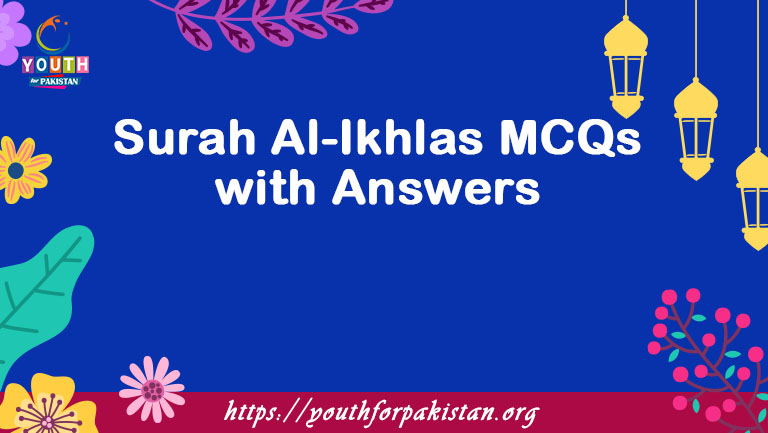The following are Surah Al-Ikhlas MCQs with answers related to Islamic Studies. We have arranged the most important and repeated MCQs in all the competitive examinations. The students can clear their concepts for Surah Al-Ikhlas MCQs online quiz by attempting these.
Surah Al-Ikhlas Online MCQs with Answers
Surah Al-Ikhlas is the _______ surah of the Quran.
a) First
b) Last
c) Middle
d) Tenth
Surah Al-Ikhlas is a chapter in the Quran that is classified as a:
a) Makki Surah
b) Madani Surah
c) Short Surah
d) Long Surah
How many verses (ayat) are there in Surah Al-Ikhlas?
a) 3
b) 5
c) 7
d) 9
Surah Al-Ikhlas is often referred to as:
a) The Praiseworthy Surah
b) The Surah of Sincerity
c) The Surah of Prophethood
d) The Surah of Wealth
What is the central theme of Surah Al-Ikhlas?
a) Stories of Prophets
b) Belief in the oneness of Allah
c) Laws and regulations
d) Historical events
Surah Al-Ikhlas emphasizes the concept of:
a) Polytheism
b) Monotheism
c) Atheism
d) Agnosticism
Which of the following is NOT one of the attributes of Allah mentioned in Surah Al-Ikhlas?
a) The All-Knowing
b) The Ever-Living
c) The Sustainer of Mankind
d) The Absolute
Surah Al-Ikhlas describes Allah as:
a) The Father
b) The Son
c) The Holy Spirit
d) The Absolute and Eternal
The phrase “Qul Huwa” in Surah Al-Ikhlas means:
a) Say, “He is”
b) Say, “I am”
c) Say, “We are”
d) Say, “You are”
Surah Al-Ikhlas asserts the concept of:
a) The Trinity
b) The Divine Unity and Oneness of Allah
c) Multiple gods
d) No gods
What does the Arabic word “Ikhlas” mean?
a) Sincerity and purity
b) Riches and wealth
c) Prayer and worship
d) Illness and hardship
Surah Al-Ikhlas is often recited to affirm one’s belief in:
a) Multiple deities
b) The oneness of Allah
c) The existence of angels
d) The importance of prayer
The first verse of Surah Al-Ikhlas begins with:
a) Bismillah
b) Alhamdulillah
c) Qul Huwa
d) A’udhu billahi min ash-shaytan ir-rajim
Surah Al-Ikhlas affirms that Allah is:
a) Born
b) Beget
c) One
d) Unknown
Surah Al-Ikhlas serves as a reminder of the importance of:
a) Prayer rituals
b) Fasting
c) Sincerity in belief
d) Charity
The term “Ahad” in Surah Al-Ikhlas means:
a) The First
b) The Last
c) The One and Only
d) The Sustainer
Surah Al-Ikhlas emphasizes that Allah:
a) Has children
b) Begets offspring
c) Has no children and is not begotten
d) Is a human-like deity
Surah Al-Ikhlas is often recited during which acts of worship?
a) Marriage ceremonies
b) Funerals
c) Daily prayers (Salah)
d) Eid celebrations
Surah Al-Ikhlas affirms the belief in:
a) The existence of multiple gods
b) The existence of angels
c) The oneness of Allah and His uniqueness
d) The worship of idols
Which Surah is often recited alongside Surah Al-Ikhlas in the daily prayers (Salah)?
a) Surah Al-Fatiha
b) Surah Al-Baqarah
c) Surah Al-Nas
d) Surah Al-Kawthar
Surah Al-Ikhlas is often recited to:
a) Seek forgiveness for sins
b) Seek protection from evil forces
c) Affirm monotheism and the oneness of Allah
d) Remember the stories of the Prophets
What is the primary message of Surah Al-Ikhlas?
a) The importance of rituals
b) The oneness and uniqueness of Allah
c) Historical events
d) The stories of previous nations
In Surah Al-Ikhlas, Allah is described as “As-Samad,” which means:
a) The All-Powerful
b) The Compassionate
c) The Absolute, Self-Sufficient
d) The Forgiving
Surah Al-Ikhlas teaches believers to have:
a) Many gods
b) No gods
c) Sincerity and purity in their belief in one God
d) Doubts and skepticism
Which of the following is NOT one of the names of Allah mentioned in Surah Al-Ikhlas?
a) Ar-Rahman (The Most Merciful)
b) Al-Malik (The Sovereign)
c) Al-Mumin (The Believer)
d) Al-Quddus (The Holy)
Surah Al-Ikhlas is often recited for:
a) Seeking knowledge
b) Seeking wealth and riches
c) Seeking protection from evil
d) Seeking revenge
The term “Lam yalid wa lam yulad” in Surah Al-Ikhlas means:
a) He begets not, nor is He begotten
b) He begets and is begotten
c) He is born and gives birth
d) He is the Creator of all beings
Surah Al-Ikhlas is a declaration of:
a) Disbelief in God
b) Faith in multiple deities
c) Faith in the oneness and uniqueness of Allah
d) Belief in angels
Which prophet is specifically mentioned in Surah Al-Ikhlas?
a) Prophet Abraham (AS)
b) Prophet Muhammad (peace be upon him)
c) Prophet Moses (AS)
d) Prophet Jesus (AS)
Surah Al-Ikhlas is often recited to:
a) Seek protection from natural disasters
b) Affirm the belief in multiple deities
c) Affirm the belief in the oneness of Allah
d) Seek forgiveness for sins
The Arabic term “Ahad” in Surah Al-Ikhlas means:
a) The One and Only
b) The Beginning and the End
c) The Eternal
d) The All-Powerful
Surah Al-Ikhlas is also known as:
a) The Longest Surah
b) The Shortest Surah
c) The Surah of Marriage
d) The Surah of Wealth
Surah Al-Ikhlas is often recited for:
a) Healing physical illnesses
b) Seeking revenge
c) Affirming the oneness of Allah and His uniqueness
d) Achieving worldly success
Surah Al-Ikhlas is a concise declaration of:
a) The entire Quran
b) The names of Allah
c) The oneness and uniqueness of Allah
d) The history of mankind
Surah Al-Ikhlas is often recited in the daily prayers as a:
a) Reminder of past events
b) Praise of worldly possessions
c) Declaration of faith and oneness of Allah
d) Request for material wealth
Surah Al-Ikhlas teaches believers to avoid:
a) Charity and helping others
b) Sincerity and purity in belief
c) The worship of multiple gods
d) Knowledge and education
In Surah Al-Ikhlas, Allah is described as “Allahus-Samad.” What does this term mean?
a) Allah is weak and powerless
b) Allah is the Sustainer of all
c) Allah is forgetful
d) Allah is non-existent
Surah Al-Ikhlas is often recited for:
a) Seeking knowledge and wisdom
b) Seeking protection from evil and harm
c) Seeking material wealth
d) Seeking revenge against enemies
What is the Arabic word for “He is Allah” in Surah Al-Ikhlas?
a) Huwa Allahu
b) Qul Huwa
c) Huwa Al-Malik
d) Huwa Al-Muhsin
Surah Al-Ikhlas is often recited to:
a) Seek revenge against enemies
b) Seek fame and recognition
c) Affirm the oneness and uniqueness of Allah
d) Remember the stories of the Prophets
The phrase “Allahu Samad” in Surah Al-Ikhlas means:
a) Allah is a human-like deity
b) Allah is the Sustainer of all
c) Allah is powerless
d) Allah is absent
Surah Al-Ikhlas is often recited for:
a) Seeking protection from natural disasters
b) Achieving fame and success
c) Seeking forgiveness for sins
d) Healing physical illnesses
The phrase “Lam yulad” in Surah Al-Ikhlas means:
a) He begets not
b) He is born
c) He gives birth
d) He is weak
Surah Al-Ikhlas emphasizes the importance of:
a) Associating partners with Allah
b) Belief in multiple deities
c) Sincerity in monotheistic belief
d) Disbelief in God
Surah Al-Ikhlas is often recited for:
a) Seeking protection from natural disasters
b) Achieving worldly success
c) Healing physical illnesses
d) Affirming the oneness of Allah
In Surah Al-Ikhlas, what does “Lam yakun lahu kufuwan ahad” mean?
a) There is nothing like unto Him
b) He is like everyone else
c) He has many equals
d) He is weak
Surah Al-Ikhlas teaches believers to reject:
a) The concept of monotheism
b) The worship of idols
c) Sincerity and purity in belief
d) The existence of angels
What is the Arabic word for “He is One” in Surah Al-Ikhlas?
a) Ahad
b) Qul
c) Samad
d) Huwa
Surah Al-Ikhlas is often recited for:
a) Achieving worldly success
b) Healing physical illnesses
c) Affirming the oneness of Allah
d) Seeking revenge against enemies
Surah Al-Ikhlas is a chapter that:
a) Contains stories of the Prophets
b) Affirms the oneness and uniqueness of Allah
c) Focuses on historical events
d) Discusses the laws and regulations of Islam










